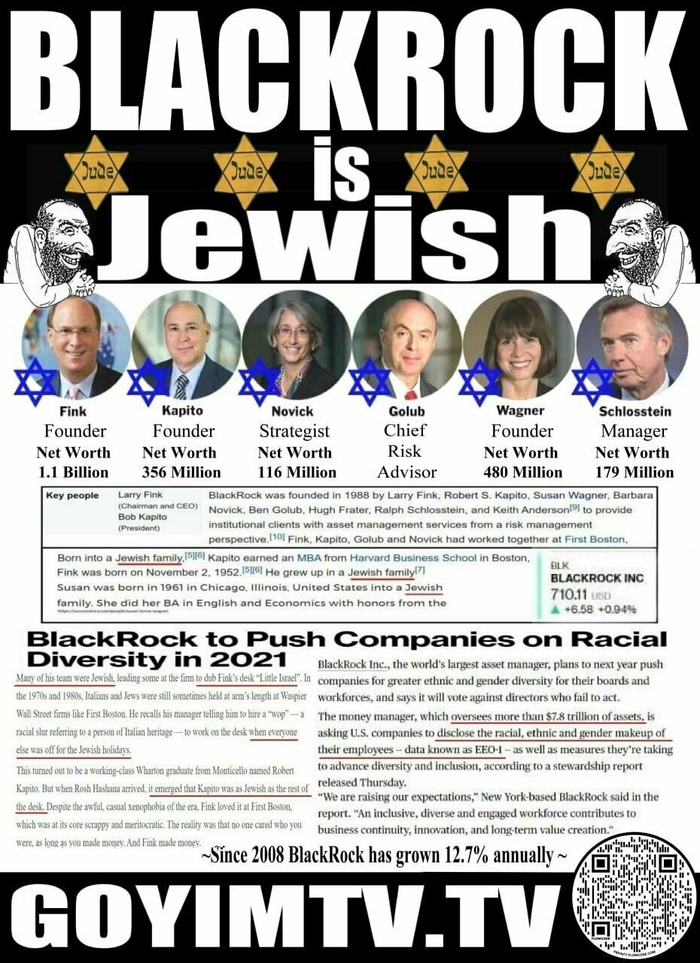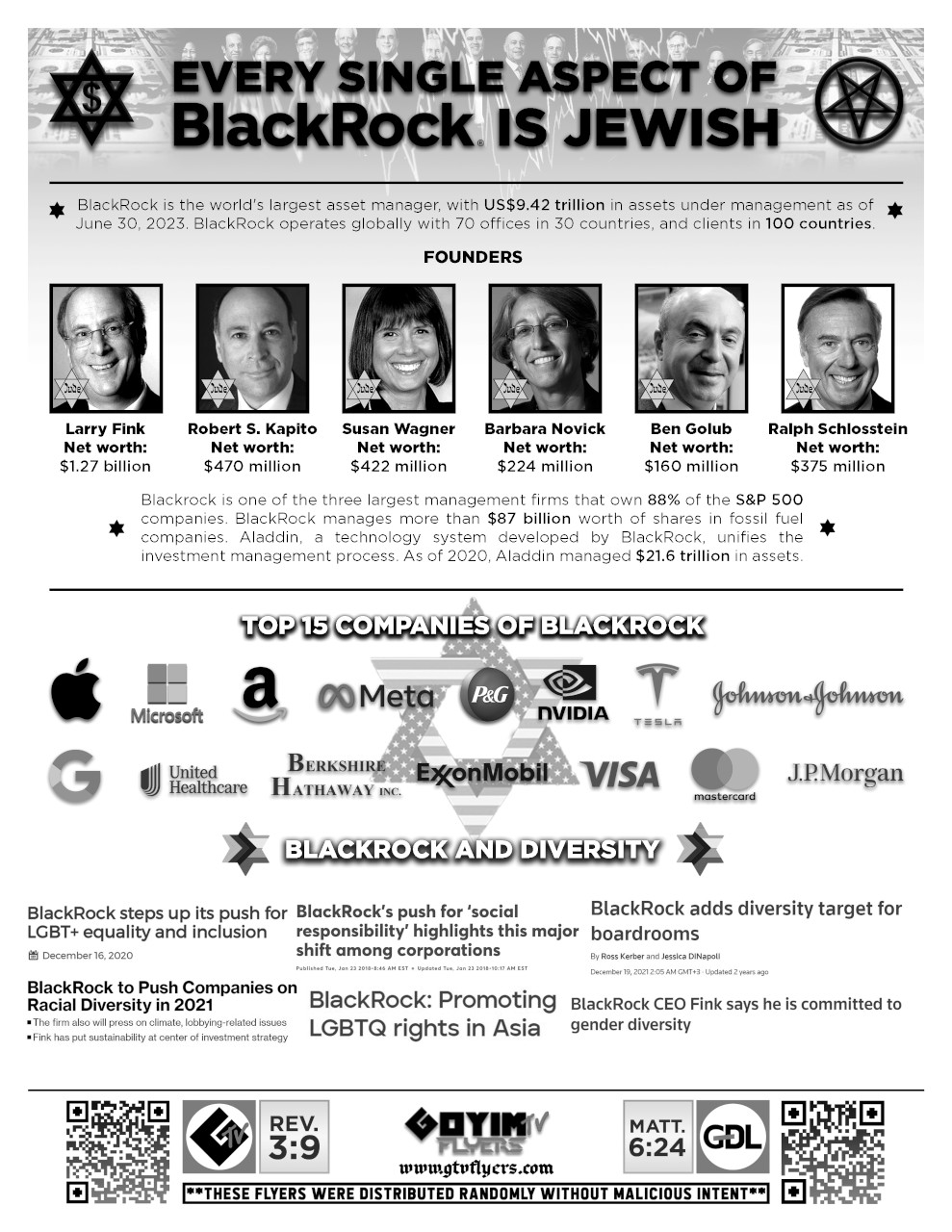The question "Is BlackRock Jewish?" has sparked significant interest and debate online, with various claims and counterclaims circulating on the internet. As one of the world's largest asset management firms, BlackRock has become a focal point for discussions about its origins, leadership, and influence. This article aims to provide a comprehensive analysis of the topic, separating fact from fiction, and addressing the key aspects surrounding this question.
Understanding the origins and nature of BlackRock requires a deep dive into its history, leadership, and corporate structure. This article will explore the roots of BlackRock, its founders, and the cultural background of its key figures. By examining the company's history and leadership, we aim to provide clarity on the question of whether BlackRock can be considered "Jewish" in any meaningful sense.
This exploration is particularly important given the sensitive nature of the topic. Misinformation and stereotypes can perpetuate harmful narratives, making it crucial to approach the subject with accuracy and fairness. Let's begin by examining the origins of BlackRock and the context in which it was founded.
Read also:Liam And Chris Hemsworth Brothers A Comprehensive Look Into Their Lives Careers And Bond
Table of Contents
- The History of BlackRock
- Who Founded BlackRock?
- Current Leadership and Cultural Background
- Ownership Structure of BlackRock
- Debunking Myths About BlackRock
- Statistical Insights on BlackRock's Influence
- The Role of Anti-Semitism in Misinformation
- Ethical Considerations in Corporate Leadership
- BlackRock's Global Impact
- Conclusion and Final Thoughts
The History of BlackRock
BlackRock, founded in 1988, emerged as a financial powerhouse in the global asset management industry. Its origins can be traced back to the Blackstone Group, where its founders initially worked before branching out to form an independent entity. Over the years, BlackRock has grown exponentially, managing trillions of dollars in assets and influencing financial markets worldwide.
Early Beginnings and Key Milestones
Understanding BlackRock's history involves looking at its early milestones. Initially focused on risk management, the company quickly expanded into asset management, leveraging its expertise in financial analysis. By the early 2000s, BlackRock had become a dominant player in the industry, acquiring other firms and expanding its global reach.
Key acquisitions, such as the purchase of Barclays Global Investors in 2009, further solidified BlackRock's position as a leader in the financial world. These strategic moves have contributed to its current status as one of the largest asset managers globally.
Who Founded BlackRock?
The founders of BlackRock include key figures such as Laurence D. Fink, who remains a central figure in the company's leadership. Understanding the backgrounds of these founders is crucial in addressing the question of whether BlackRock is "Jewish."
Read also:Does Elvis Presley Have Any Grandchildren Unveiling The Legacy Of The King Of Rock And Roll
Laurence D. Fink: A Profile
Laurence D. Fink, the CEO and co-founder of BlackRock, was born in 1952 in Brooklyn, New York. His Jewish heritage is well-documented, but it is essential to note that his professional achievements are based on his expertise in finance and leadership, rather than any religious or cultural affiliation. Fink's career spans decades of innovation and growth in the financial sector.
Other co-founders of BlackRock include individuals with diverse backgrounds, reflecting the company's commitment to inclusivity and diversity in its leadership.
Current Leadership and Cultural Background
Today, BlackRock's leadership team comprises professionals from various cultural and religious backgrounds. This diversity is reflective of the company's global reach and commitment to inclusivity. While some leaders, like Laurence Fink, have Jewish heritage, others come from different cultural and religious traditions.
Key Members of the Leadership Team
- Laurence D. Fink - CEO and Co-Founder
- Rob Kapito - President and Co-Founder
- Barbara Novick - Vice Chairman
Each member of the leadership team brings unique perspectives and expertise to BlackRock, contributing to its success and innovation in the financial world.
Ownership Structure of BlackRock
The ownership structure of BlackRock is another critical aspect in addressing the question of its "Jewish" identity. BlackRock is a publicly traded company, with shares owned by a diverse range of investors, including institutional investors, mutual funds, and individual shareholders.
Major Shareholders
Major shareholders of BlackRock include well-known financial institutions and investment firms. This diversity in ownership further underscores the global nature of the company and its broad base of investors. The ownership structure does not align with any specific religious or cultural group, reinforcing the idea that BlackRock is a multinational corporation with a diverse investor base.
Debunking Myths About BlackRock
Misinformation about BlackRock's origins and leadership has led to various myths, including the claim that it is a "Jewish-controlled" company. These claims often stem from misunderstandings or deliberate misinformation campaigns. It is essential to separate fact from fiction when discussing BlackRock's identity.
Common Myths and Their Origins
- Myth: BlackRock is solely controlled by Jewish investors. Fact: BlackRock's ownership is diverse, with shares held by a wide range of institutional and individual investors.
- Myth: BlackRock's leadership is exclusively Jewish. Fact: The leadership team includes professionals from various cultural and religious backgrounds.
Addressing these myths requires a critical examination of the available evidence and a commitment to factual accuracy in discussions about BlackRock.
Statistical Insights on BlackRock's Influence
BlackRock's influence in the global financial market is undeniable. With assets under management exceeding $10 trillion, the company plays a pivotal role in shaping investment strategies and financial policies worldwide. These statistics highlight the significance of BlackRock's operations and its impact on the global economy.
Key Statistics
- Total Assets Under Management: Over $10 trillion
- Number of Employees: More than 18,000
- Global Presence: Operations in over 30 countries
These figures underscore BlackRock's position as a leader in the financial industry, influencing markets and economies across the globe.
The Role of Anti-Semitism in Misinformation
The question of whether BlackRock is "Jewish" often intersects with broader discussions about anti-Semitism and misinformation. Claims that powerful institutions are "Jewish-controlled" have historical roots in anti-Semitic propaganda. It is crucial to address these claims critically and with sensitivity, ensuring that discussions about BlackRock remain grounded in facts and fairness.
Combatting Anti-Semitism Through Education
Education and awareness are key to combating anti-Semitism and misinformation. By promoting accurate information about BlackRock and its leadership, we can challenge harmful stereotypes and foster a more informed public discourse.
Ethical Considerations in Corporate Leadership
Ethical leadership is a cornerstone of BlackRock's operations. The company emphasizes transparency, accountability, and responsibility in its business practices. These principles guide its interactions with clients, investors, and communities worldwide, ensuring that its influence is positive and constructive.
BlackRock's Commitment to ESG
BlackRock's focus on Environmental, Social, and Governance (ESG) factors reflects its commitment to ethical leadership. By prioritizing sustainability and social responsibility, BlackRock aims to create long-term value for its stakeholders and contribute positively to society.
BlackRock's Global Impact
BlackRock's influence extends beyond the financial sector, impacting economies, industries, and communities worldwide. Through its investments and leadership, BlackRock plays a crucial role in shaping the global economic landscape. Understanding its impact requires examining its operations, strategies, and partnerships.
Case Studies of BlackRock's Influence
- Investment in renewable energy projects
- Partnerships with governments and NGOs
- Leadership in corporate governance initiatives
These case studies illustrate BlackRock's commitment to creating positive change and fostering sustainable growth in the global economy.
Conclusion and Final Thoughts
In conclusion, the question "Is BlackRock Jewish?" requires a nuanced and informed response. While some of its founders and leaders have Jewish heritage, BlackRock's identity is defined by its global reach, diverse ownership, and commitment to ethical leadership. Addressing this question involves separating fact from fiction and promoting accurate information about the company and its operations.
We invite readers to engage in this discussion by sharing their thoughts and insights. Your feedback is valuable in fostering a more informed and respectful discourse about BlackRock and its role in the global financial landscape. For further reading, explore our other articles on finance, leadership, and corporate responsibility.
References:
- BlackRock Official Website
- Statista - BlackRock Market Statistics
- Forbes - Profiles of Key Leaders
- Harvard Business Review - Articles on Corporate Ethics



